About Using Relation Files (*rel) to Add Relations to Components
You can use *.rel files to set up default relations for EMX components. By default, *.rel files are located in the folder <emx_install>\configuration\templates. This folder also contains valid file names and valid locations in the configuration.
Using the general relation file “emx_comp.rel”
The file emx_comp.rel defines a relation for all EMX components such as cooling, ejector pins. It also applies for components from the EMX library.
|
|
In the default installation, you will find a file called inactive_emx_comp.rel. This is a template file that can be used as a reference. When you rename the file to emx_comp.rel, the content will be written into the relation area of the Creo part.
|

When adding an EMX component, you will find the content in the Plate, Component, or Library Component dialog box on the Relation tab:
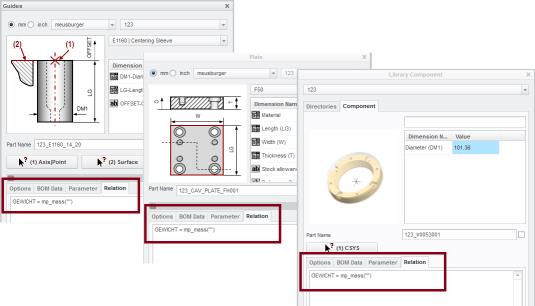
Using plate relation files
To add a relation to all plates of a specific supplier, use files with the name plate.rel.
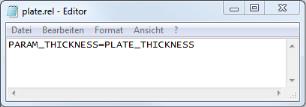
You need to save the plate.rel file to the location <emx_install>\mm\components\plates\<supplier>\
This relation will be written into the Relation tab of the Plate dialog box:
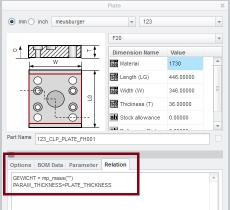
The relation from emx_comp.rel will not be overwritten. Instead, it will be added underneath the existing relations. |
Using plate type specific relation files
When a plate type specific relation needs to be added, the plate_#.rel file can be used.
In this example, a relation file for the plate template plate_1.prt is used.
When the plate type specific file plate_1.rel exists, the content of plate.rel is ignored and the content of the type specific relation is used.
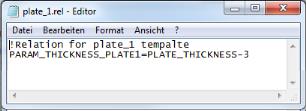
The plate.rel file needs to be saved to the location <emx_install>\mm\components\plates\<supplier>\
This relation will be written into the Relation tab of the Plate dialog box.
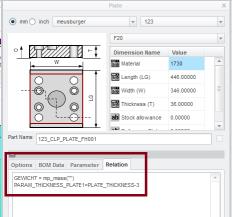
In EMX, the following eight default plate template types exist: • plate_1 — Clamping Plate • plate_2 — Core Pin Retainer Plate • plate_3 — Support Plate • plate_4 — Rail Plate • plate_5 — Cavity Plate • plate_6 — Ejector Retainer Plate • plate_7 — Ejector Base Plate • plate_8 — Stripper Plate |
Using component relation files
Similar to plates, relations can be added to other components with the component relation files. In this example, the screw specific file is used. This can be done for other component types as well.
When the file screw.rel is located in the location <emx_intall>\components\mm\screw\,
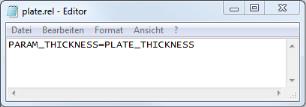
this content will be appear in the Relation tab of the Component dialog box.
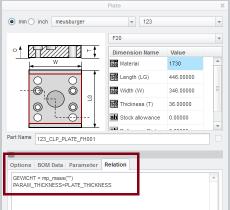
This relation will be written into the Relation tab of the Plate dialog box.
The relation from emx_comp.rel will not be overwritten. Instead, it will be added underneath the existing relations. |
Using specific type component relation files
If the relation should only be applied for one specific template of one supplier, you can use type specific relation files.
In this example, a screw with the template name screw_e1200.prt is used,
The screw_e1200.rel file needs to be saved in the location <emx_install>\mm\components\screw\<supplier>\
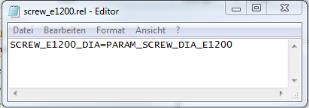
This content will appear in the Relation tab of the Screw dialog box.
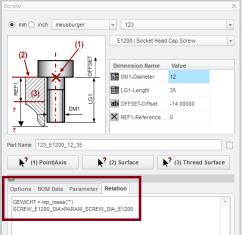
Adding relations to the Post-Regeneration-Area
Before you add a relation to the post regeneration areas of the part, you must add a relation file with the post fix _post_regen as described above.
For example, emx_comp_post_regen.rel , plate_post_regen.rel, and so on.